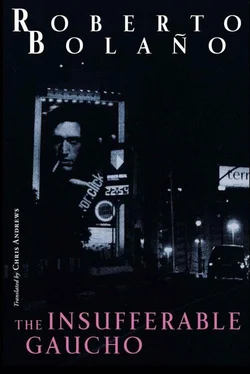One night, sick of hearing the old guys rambling on about psychiatric hospitals and slums where parents made their children go without milk so they could travel to support their soccer team in some historic match, he asked them about their political opinions. At first the gauchos were reluctant to talk about politics, but when he finally got them to open up, it turned out that, in one way or another, they were all nostalgic for General Perón.
This is where we part company, said Pereda, and pulled out his knife. For a few seconds he thought that the gauchos would do the same and his destiny would be sealed that night, but the old guys recoiled in fear and asked what he was doing, for God’s sake. What had they done? What had got into him? The flickering fire threw tiger-like stripes of light across their faces, but, gripping his knife and trembling, Pereda felt that the shame of the nation or the continent had turned them into tame cats. That’s why the cattle have been replaced by rabbits, he thought as he turned and walked back to his room.
I’d slaughter the lot of you if you weren’t so pathetic, he shouted.
The next morning he was worried that the gauchos might have gone back to Capitán Jourdan, but they were all still there, working in the yard or drinking mate by the fire, as if nothing had happened. A few days later the skirted woman arrived from the ranch out west and Alamo Negro began to change for the better, starting with the food, because the woman knew ten different ways to cook a rabbit, and where to find herbs, and how to start a kitchen garden and grow some fresh vegetables.
One night the woman walked along the veranda and went into Pereda’s room. She was wearing only a petticoat; the lawyer made space for her in the bed, and spent the rest of the night looking up at the ceiling and feeling that warm and unfamiliar body against his ribs. Day was breaking by the time he fell asleep, and when he woke up, the woman was gone. Got yourself shacked up, said Bebe when his father informed him. Only technically, the lawyer pointed out. By that stage, with money borrowed here and there, he had been able to enlarge the stables and acquire four cows. When he was bored of an afternoon, he would saddle up José Bianco and take the cows out for a walk. The rabbits, who had never seen a cow in their lives, stared in amazement.
Pereda and the cows looked like they were bound for the ends of the earth, but they had just gone out for a walk.
One morning a doctor and a nurse appeared at Alamo Negro. Having lost their jobs in Buenos Aires, they were working for a Spanish NGO, providing a mobile medical service. The doctor wanted to test the gauchos for hepatitis. When the pair came back a week later, Pereda did his best to put on a feast: rice and rabbit casserole. The doctor said it tasted better than paella valenciana , then proceeded to vaccinate all the gauchos free of charge. She gave the cook a bottle of pills and told her to make sure each child took one every morning. Before they left, Pereda asked how his folks were doing health-wise. They’re anemic, said the doctor, but no one has Hepatitis B or C. That’s a relief, said Pereda. Yes, I guess it is, said the doctor.
As they were getting ready to go, Pereda took a look inside their van. The back was a mess: sleeping bags and boxes full of first-aid supplies: medicines and disinfectants. Where are you going now? he asked. South, said the doctor. Her eyes were red and the lawyer couldn’t tell if it was due to lack of sleep or to crying. As the van drove away raising a cloud of dust, he thought he would miss them.
That night he spoke to the gauchos gathered in the general store. I believe we are losing our memory, he said. And just as well too. For once, the gauchos looked at him as if they had a better grasp of what he was saying than he did himself. Shortly afterward, he received a letter from Bebe summoning him to Buenos Aires: he had to sign some papers so that his house could be sold. Should I take the train, Pereda wondered, or ride? That night he could hardly sleep. He imagined people thronging the sidewalks as he made his entry mounted on José Bianco. Cars stopping, dumbstruck policemen, a newspaper vendor smiling, his compatriots playing soccer in vacant lots with the parsimonious movements of the malnourished. Pereda’s entry into Buenos Aires, as he imagined the scene, had the ambiance of Christ’s entry into Jerusalem or Brussels as depicted by Ensor. All of us enter Jerusalem sooner or later, he thought as he tossed and turned. Every single one of us. And some never leave. But most do. And then we are seized and crucified. Especially the poor gauchos.
He also imagined a downtown street, the quintessential Buenos Aires street, with all the charms of the capital; he was riding along it on his trusty José Bianco, while from the windows above white flowers began to rain down. Who was throwing the flowers? He couldn’t tell, since, like the street itself, the windows of the buildings remained empty. It must be the dead, Pereda supposed drowsily. The dead of Jerusalem and the dead of Buenos Aires.
The next morning he spoke with the skirted woman and the gauchos and told them he would be away for a while. None of them said anything, although that night, at dinner, the woman asked if he was going to Buenos Aires. Pereda nodded. Then take care and may the rain fall soft on you, said the woman.
Two days later, he took the train and went back the way he had come more than three years earlier. When he arrived at Constitución station, a few people stared as if he were wearing fancy dress, but most were not particularly perturbed by an old man attired like a cross between a gaucho and a rabbit trapper. The taxi driver who took him to his apartment inquired where he was from, and when Pereda, lost in his own ruminations, failed to answer, asked if he spoke Spanish. By way of reply, Pereda pulled out his knife and proceeded to trim his nails, which were as long as a wild cat’s.
No one answered the door. The keys were under the mat; he went in. The apartment seemed clean, perhaps even too clean — it smelled of mothballs. Feeling exhausted, Pereda trudged to his bedroom and flopped onto the bed without taking off his boots. When he woke up it was dark. He went into the living room without switching on any lights, and called his cook. First he spoke to her husband, who wanted to know who was calling, and didn’t sound very convinced when he identified himself. Then the cook came on. I’m in Buenos Aires, Estela, he said. She didn’t seem surprised. When asked if she was happy to know that he was back home, she said: There’s always something unexpected happening here. Then he tried to call his maid, but an impersonal, female voice informed him that the number he had dialled was not in service. Feeling dispirited and perhaps hungry, he tried to remember the faces of his employees, but the images he could summon were vague: shadows moving in the corridor, a commotion of clean laundry, murmurs and hushed voices.
The amazing thing is that I can remember their phone numbers, thought Pereda, sitting in the dark living room of his apartment. A little later on he went out. Wandering aimlessly, or so he thought, he ended up at the cafe where Bebe used to meet his artistic and literary friends. From the street he looked into the spacious, well-lit, bustling interior. Bebe and an old man (an old man like me! thought Pereda) were presiding over one of the most animated tables. At another, closer to the window through which Pereda was spying, he noticed a group of writers who looked more like advertising executives. One of them, with an adolescent air, although he was at least fifty and maybe even over sixty, kept putting a white powder up his nose and holding forth about world literature. Suddenly, the eyes of the pseudo-adolescent met Pereda’s. For a moment their gazes locked, as if, for each of them, the presence of the other were a gash in the ambient reality. Resolutely and with surprising agility, the writer with the adolescent air sprang to his feet and rushed out into the street. Before Pereda knew what was going on, the writer was upon him.
Читать дальше












